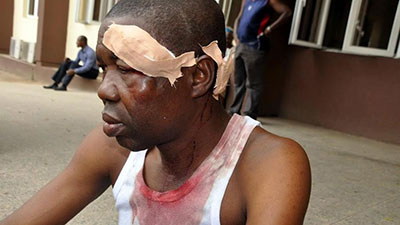Hardly ever do Nigerian journalists get justice for assaults suffered in the line of duty. But things may be set to change with the case of Benedict Uwalaka, a photojournalist with Leadership Newspapers, who on August 9 was brutally assaulted at a government hospital in Lagos State. The first step toward justice came 22 days later, when Bayo Ogunsola, one of the assailants identified by Uwalaka, was arraigned in court on August 31 on a two-count charge of assault and destruction of the journalist’s camera. Ogunsola pleaded not guilty on both counts.
Uwalaka broke down in tears at the magistrate court when the police arraigned Ogunsola, funeral services director of TOS Funerals, the private company operating the mortuary at the Lagos State University Teaching Hospital, according to news reports.
The case shows that justice is within reach when journalists unite and remain resilient toward achieving their goal, and that leveraging the media is an effective tool to combat impunity for attacks on journalists.
Images and video show Uwalaka’s assailants beating him and breaking a bottle on his head in a bid to prevent him from covering the release of victims’ remains after a DANA Air crash which claimed at least 153 lives. The June 3 crash made international headlines and led to the grounding of the airline’s planes and an investigation of the aviation industry. Dele Ogunsola, brother of the alleged assailant and a director of the company, which is a family business, had told me it was Uwalaka who instigated the violence. “It is wrong for a journalist to want to publish pictures of remains. It’s very unsympathetic to families,” Dele Ogunsola said.
The attack on Uwalaka was condemned by individuals, press unions, and rights groups, and Lagos State Governor Babatunde Fashola ordered an investigation and promised justice. But Leadership Newspapers accused the police of complicity for their unwillingness to arrest the suspects. Meanwhile, the print and electronic media have continually kept the case in the news with updates, and Uwalaka’s employers have doggedly chronicled every activity around the assault–public condemnations, solidarity visits by sympathizers, promises of swift investigations from state and federal authorities, and finally the suspect’s arraignment in court. Despite appeals for an out-of-court settlement, Iyobosa Uwugiaren, the managing editor of Leadership Newspapers, told me the company is determined to support Uwalaka throughout the trial due to begin on Oct. 4.
Uwalaka however told me that his family members have put pressure on him to drop the case. “My immediate family members are asking me to withdraw the case but my village community has refused this. I have told everyone the case is beyond me now since the union is handling it,” Uwalaka said.
The Nigeria Union of Journalists (NUJ) says it is supporting Uwalaka in pursuing the case to its conclusion, rather than settling out of court, as a deterrent against future abuse of journalists. Deji Elumoye, chairman of the NUJ’s Lagos State chapter, who led journalists on a protest march to the office of the governor on August 16, told me the union in coming days will also file a civil suit against TOS Funerals to claim damages for Uwalaka.
“They have called severally and come personally. But the NUJ is not settling out of court,” Elumoye said. “We have taken a stand to use this as a test case for the public to know that journalists are friends and not foes. We will pursue this case to a logical conclusion in court.”
The effectiveness of the pressure from the media is particularly striking given that in the past 26 years –since the parcel bomb assassination of prominent journalist Dele Giwa on October 19, 1986–justice has evaded journalists who have been victims of murders, assassination attempts, kidnappings, assaults, and threats, both hidden and occurring in full view of the public, according to CPJ research.
UPDATED: The final paragraph has been corrected to reflect that the murder of Dele Giwa was 26 years ago, not 24 years as previously stated.
